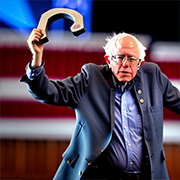|
dxt posted:Plenty pesky labor laws to strike down They’re probably going to dismantle the regulatory state, but it will be a multi-year affair so as to not gently caress with the money, and labor is part of that They’re probably going to increasingly empower the police state, to make sure property stays protected Fun times ahead
|
|
|
|

|
| # ? Jun 10, 2024 00:45 |
|
They're going to get rid of the CFPB in its entirety next term
|
|
|
|
Zerg Mans posted:They're going to get rid of the CFPB in its entirety next term Oh yeah for sure but that doesn’t cause the same kind of market chaos that just wholesale eliminating the EPA does, probably makes the markets pleased as punch, eliminating the EPA wholesale just kills a lot of tertiary industries that have popped up around compliance and they’ll want to slow walk it to give capital time to wind down and get out
|
|
|
|
Since Medicare is administered by the Department of Health and Human Services, and they already decided that there are no legal policies from the executive branch, can't they basically say that Medicare exists in law but all the regulations have to be thrown out? Likewise for social security, and basically any executive order they just want to claim needs to be ratified by Congress?
|
|
|
|
PhantomOfTheCopier posted:Since Medicare is administered by the Department of Health and Human Services, and they already decided that there are no legal policies from the executive branch, can't they basically say that Medicare exists in law but all the regulations have to be thrown out? they can actually say whatever they want op
|
|
|
|
PhantomOfTheCopier posted:Since Medicare is administered by the Department of Health and Human Services, and they already decided that there are no legal policies from the executive branch, can't they basically say that Medicare exists in law but all the regulations have to be thrown out? They can very much say that. The question is how much it impacts the billionaires who they’re in the bag for. There’s a lot of loving money in Medicare and Medicaid. A lot of personal fortunes that depend on it. It’s a huge give away to hospital groups and shady medical device importers and on and on, so there isn’t the same willingness to just wholesale end this poo poo, much like the ACA survived both legal challenges and congressional repeal. Too much money to be made keeping it around to want to actually get rid of it
|
|
|
|
PhantomOfTheCopier posted:Since Medicare is administered by the Department of Health and Human Services, and they already decided that there are no legal policies from the executive branch, can't they basically say that Medicare exists in law but all the regulations have to be thrown out? Thats essentially how Roberts killed medicaid expansion
|
|
|
|
one neat trick https://twitter.com/kylegriffin1/status/1682499517474537472?t=74HIC_3mtzhGQfjCjk5iJQ&s=19
|
|
|
|
having two majority black districts results in the same total marginalization of the community but they can't really just can't help themselves
|
|
|
|
oh so now you want the court to be anti democratic. how interesting.
|
|
|
|
The 25th anniversary of Clarence Thomas’s confirmation to the Supreme Court was approaching — a moment that would draw attention to his accomplishments on the bench but also to the misconduct claims that had nearly derailed his rise. Among the wave of retrospective accounts set to come out that year, 2016, was a star-studded HBO film dramatically recounting Anita Hill’s sexual harassment allegations. That spring, a flurry of opinion articles defending Thomas and railing against the film appeared in news outlets, penned by a D.C. lawyer who had worked in the George H.W. Bush White House during the confirmation. Websites celebrating Thomas’s career — and attacking his onetime accuser — popped up. And on Twitter, a new account using the name “Justice Thomas Fan Account” began serving up flattering commentary. “Justice Thomas: The most open & personable of Justices, intimate in sharing his feelings, easily moved to laughter,” read one early tweet on the account. It was not apparent at the time, but the rush of favorable content was part of a coordinated and sophisticated public relations campaign to defend and celebrate Thomas, according to a Washington Post examination of public and internal records and interviews with people familiar with the effort. The campaign would stretch on for years and include the creation and promotion of a laudatory film about Thomas, advertising to boost positive content about him during internet searches and publication of a book about his life. It was financed with at least $1.8 million from conservative nonprofit groups steered by the judicial activist Leonard Leo, the examination found. Leo, a longtime executive of the Federalist Society, the influential nonprofit organization for conservative and libertarian lawyers, is well-known for his efforts to push the judiciary to the right. Using a network of closely related nonprofits over which he holds sway, Leo has led advocacy campaigns to help confirm every conservative Supreme Court justice over the past two decades. He advised President Donald Trump on his selection of three justices. The public relations campaign shows how he has continued to exert influence in support of right-leaning justices after helping them secure lifetime appointments. It adds to an emerging portrait of Leo as a behind-the-scenes benefactor, defending the justices from public criticism and exalting their jurisprudence while tending to personal matters including private travel and a spouse’s employment. Leo steered tens of thousands of dollars in consulting payments to Thomas’s wife, Virginia “Ginni” Thomas, in 2012, The Post reported recently. He also arranged a fishing trip to Alaska for Justice Samuel A. Alito Jr. in 2008, a vacation that included a free ride on the private jet of a billionaire businessman who later had interests before the court, ProPublica reported. Those and other revelations about wealthy conservative donors gaining access to justices outside the public eye have brought scrutiny to the court in recent months. The resources available to Leo expanded vastly in 2020, when a nonprofit organization he chairs received a $1.6 billion contribution from the Chicago businessman Barre Seid. The extent of Leo’s involvement in the public relations campaign, including the financial backing for websites and articles defending Thomas, has not been previously disclosed. Leo declined to answer detailed questions from The Post about his role in the campaign. In a statement, he praised the film he helped finance about Thomas, titled “Created Equal: Clarence Thomas in His Own Words.” “Our network was thrilled that Created Equal brought Justice Clarence Thomas, in his own words, into the homes of millions of Americans, so they could learn firsthand who he is, what he stands for, and what the Constitution really means,” Leo said in the statement. He also noted that liberal Justice Ruth Bader Ginsburg had been the subject of a documentary, “RBG,” distributed by a company that says it creates content that “stands at the intersection of art and activism” and whose founder has donated to left-leaning causes. Thomas did not respond to questions sent through a court spokeswoman. In 2016, Mark Paoletta, the D.C. lawyer and former White House aide who helped with Thomas’s confirmation, set the public relations campaign in motion and served as its public face. On required forms he filed when he later joined the Trump administration, Paoletta disclosed that a nonprofit group called the Judicial Education Project had paid him and his firm nearly $300,000 that year for “media projects.” In response to questions from The Post, he confirmed that the projects were related to Thomas and that “my good friend Leonard Leo’s group provided funding for this work,” including the Thomas film. As with many of the nonprofit entities in his network, Leo has no formal role on the Judicial Education Project, meaning his influence is not apparent from public records. Leo previously told The Post that he is an adviser to the organization. Paoletta, who described Thomas as a “dear friend,” said in a written statement that the justice has been “outrageously maligned because he is a black conservative who has never bowed to those on the Left who demand that he think a certain way because of the color of his skin.” “Unlike Presidents or Members of Congress, Justices do not have an infrastructure of employees to help defend them from these political attacks,” added Paoletta, who now works at a law firm headed by former clerks for Thomas and Justice Antonin Scalia and is a senior fellow at the nonprofit Center for Renewing America, which lists among its key policy areas fighting big tech, mask mandates and “woke” culture. Paoletta said he has not been paid by Leo or anyone else to defend Thomas since the end of 2016, shortly before he joined the Trump administration, although the film Paoletta was paid to develop that year did not come out until 2020. He remains close to the justice and his wife, serving as their outspoken defender, representing Ginni Thomas before the Jan. 6 congressional select committee and sitting next to her last month in the justice’s reserved courtroom seats on the occasion of Thomas’s 75th birthday. Another nonprofit entity advised by Leo, the Judicial Crisis Network, continued parts of the public relations campaign more recently. The nonprofit has said it spent $1.5 million last year to promote the Thomas film. It still maintains three social media accounts honoring Thomas. Thomas’s allies have long worked to bolster his legacy. Harlan Crow, a Texas billionaire and GOP donor who ProPublica revealed this year has taken Thomas on luxury vacations, has made donations to dedicate a library wing to Thomas in Savannah, Ga., to transform a cannery in the community where Thomas grew up into a museum and to commission a painting of Thomas to be displayed at his alma mater, Yale Law School. The public relations campaign, however, marked a more aggressive approach that sought to sway public opinion through mass media. This report is based on a review of nonprofit organizations’ tax filings, government financial disclosure forms, domain registration and other website data, and internal documents from a public relations firm that worked on the campaign. It also draws from interviews with people who worked at the firm, CRC Public Relations. The HBO movie “Confirmation” starred Emmy-nominated actress Kerry Washington as Hill, a law professor who had testified that Thomas sexually harassed her when he was her superior at the Department of Education and later at the U.S. Equal Employment Opportunity Commission, where Thomas was chairman. Wendell Pierce, known for his role as Baltimore detective Bunk Moreland in the HBO series “The Wire,” played Thomas. Paoletta obtained a copy of an early script and said he was outraged by what he viewed as falsehoods and an overly sympathetic portrayal of Hill. He began prodding the filmmakers before the movie’s release. “The numerous distortions, omissions and fabrications in the script all appear to be done with the goal of bolstering Anita Hill’s credibility and smearing those who debunked her 11th hour allegations,” Paoletta wrote on March 7, 2016, in a letter to HBO’s president, its chief executive and the writer of the screenplay. In response to public criticism from Thomas’s allies, HBO’s then-President Len Amato said in an interview at the time that the network had “no agenda” and called the movie “quite evenhanded.” Paoletta has written that he and Thomas first met when Paoletta was in college and Thomas was chairman of the EEOC and that they reconnected in 1989, when Thomas was nominated to the U.S. Court of Appeals for the D.C. Circuit. At the time, Paoletta worked on judicial nominations for the Bush administration, and their friendship grew when he helped with Thomas’s Supreme Court confirmation in 1991. Paoletta later spent a decade on Capitol Hill as the chief counsel for the House Energy and Commerce Committee. He joined the Trump administration in 2017, first as counsel to Vice President Mike Pence and then as general counsel for the Trump administration’s Office of Management and Budget. By the time he sent the letter to HBO executives, Paoletta had contacted Javelin, a public relations firm in Alexandria, Va., for help building a website, called confirmationbiased.com, to rebut portrayals in the film. “I was determined to not let these lies go unanswered, so I reached out to Javelin to help me develop a media presence to push back,” he told The Post. It was around this time that the Judicial Education Project began paying Paoletta to run “media projects (e.g., articles, websites),” records show. Paoletta was paid $84,000 as a consultant for the group from March to August 2016, he reported in a financial disclosure form he filed while joining the Trump administration. During that time frame, Paoletta wrote multiple op-eds attacking Anita Hill’s credibility and the HBO movie in publications such as the Daily Caller, the National Review and the Washington Examiner. “It is not surprising to see HBO, a network with a history of liberal bias, make such a movie,” he wrote in March 2016 in the Washington Examiner, which described him as a lawyer who worked in the White House Counsel’s Office during the Thomas confirmation hearings. He did not disclose in any of the op-eds that he was being paid. In his statement to The Post, Paoletta said: “No one has ever approved anything I’ve said in defense of Justice Thomas. They are my words alone.” In September 2016, Paoletta launched his own firm called MP Strategies. The Judicial Education Project, which until then had paid him directly, paid the firm $210,000 through the end of the year, as Paoletta prepared to join the Trump administration, his disclosure form shows. He described the work as “media projects — articles, websites, and documentary.” During that time, he continued writing op-eds about Thomas, including one in The Post headlined, “Why doesn’t Clarence Thomas get his due?” An op-ed carrying his byline in The Hill criticized the new National Museum of African American History and Culture for including only a passing mention of Thomas — a reference to the Anita Hill allegations. After that criticism, the museum added a display on Thurgood Marshall and Thomas, the Supreme Court’s first two African American justices. While it was financing the publicity campaign defending Thomas, the Judicial Education Project was pursuing its own interests before the court. In April 2016, a month after it began paying Paoletta, the group filed an amicus brief challenging an Obama program that would have allowed undocumented immigrant parents to work legally in the United States. The Supreme Court, down to only eight justices because of the death of Scalia, split 4-4 on the case, United States v. Texas, meaning a lower court’s decision striking down the program was upheld. The court issued its decision without releasing how each justice voted. The Judicial Education Project declined to comment for this story. Organizations in Leo’s network have taken up a variety of conservative causes, including promoting religious liberties and curtailing abortion rights and business regulations. Paoletta’s work for the Judicial Education Project continued into new areas after the HBO movie was released. Paoletta began working with the public relations firm closely tied to Leo, CRC Public Relations, to expand the digital component of the Thomas project, according to records and interviews. CRC was the go-to public relations firm for nonprofit groups in Leo’s network, which paid the firm millions of dollars each year, tax filings show. Leo has since become chairman of the firm, which has changed its name to CRC Advisors. Working with Paoletta, CRC created the Thomas fan Twitter account in September 2016 and posted quotes from the justice, video clips of his public appearances and tidbits about his career and personality, according to archived images of the account and a former employee of the firm who spoke on the condition of anonymity to discuss its inner workings. The account’s bio at the time did not say who operated it but said it was “dedicated to Justice Clarence Thomas and his 25 years of jurisprudence on the Supreme Court of the United States.” An internal document shows CRC was closely tracking the growth of its early Twitter activity about Thomas. Between Oct. 12 and Nov. 8 that year, the account’s posts about the justice generated nearly 21,000 impressions, according to the internal spreadsheet describing the reach of the “Justice Thomas” project. Around the same time, CRC registered a number of new websites about Thomas and Anita Hill. They included anitahillcase.com, a still-active site that says it “presents the overwhelming evidence of why Hill’s story did not add up,” and justicethomas.com, which salutes the justice’s life and legacy. Paoletta handpicked articles he wanted posted on the site honoring Thomas, according to the CRC employee and an internal spreadsheet listing his comments on dozens of articles. “Mark says he likes quote about bushel, faith,” said one note in the spreadsheet, an apparent reference to a May 2016 speech Thomas gave at a Hillsdale College commencement ceremony in which he advised graduates not to “hide your faith and your beliefs under a bushel basket.” Another note appeared to instruct CRC employees not to include articles that referred to Thomas’s well-known reticence on the bench during that period: “Doesn’t like part about CT not asking Qs.” The firm also bought ads from Google to boost favorable internet content about Thomas, according to the employee and a separate internal document. An internal CRC spreadsheet obtained by The Post shows that the Google advertising campaign generated almost 11,000 views between Oct. 12 and Nov. 8. Paoletta did not directly address questions from The Post about who paid for CRC’s work. CRC declined to comment for this story. But the Leo-advised Judicial Crisis Network disclosed in its tax filings from 2016 to 2018 that its activities included maintaining websites “recognizing the legacy of Clarence Thomas.” The tax filings do not identify those websites or specify what firm created them, but they do show payments to CRC in those and other years. The bio for the Thomas fan Twitter account started by CRC in late 2016 now says it is owned and operated by the Judicial Crisis Network. It had nearly 30,000 followers as of early July. The Judicial Crisis Network also now runs Instagram and Facebook pages honoring Thomas, according to bios on those accounts. The Judicial Crisis Network declined to comment for this story. Although Leo’s name does not appear on the Judicial Crisis Network’s paperwork, the group shared the same floor in a D.C. building as the Federalist Society, The Post previously reported. Leo said publicly in 2020 that he and an associate were rebranding the group the Concord Fund and planned to pump tens of millions of dollars into it. As the new Thomas-centered social media accounts and websites began championing the justice online, Paoletta embarked on a new venture: a film. Paoletta enlisted the conservative filmmaker Michael Pack as the movie’s writer and director. Between November 2017 and March 2018, Pack spent more than 30 hours interviewing Clarence and Ginni Thomas for the film, Pack later wrote. The result was “Created Equal,” a two-hour film in which the only people interviewed are Thomas and his wife. Funders of the film’s production or marketing included the Judicial Education Project, the Crow family and an “anonymous” donor, according to the film’s credits. One of Crow’s companies, Crow Holdings Pool, gave $100,000 in 2018 to a nonprofit led by Pack that raised money to produce the film, documents obtained by The Post show. In the film, Clarence Thomas flatly denies Anita Hill’s allegations (“That didn’t happen,” he says, shrugging). The movie traces the arc of Thomas’s rise from poverty in the Jim Crow South and argues that the left has attacked Thomas over the years because it believes he has the wrong politics for a Black man. The film shows political cartoons portraying him as a Ku Klux Klan member and showing him shining Scalia’s shoes. In the fall of 2019, the film was screened at the National Archives for Thomas and his friends and allies. The Examiner’s editor in chief wrote in a column that the crowd of “judges and hard-bitten lawyers … wept,” and the Examiner’s editor declared the work a “magnificent and necessary corrective to the venomous falsehoods that have been heaped for a quarter of a century on a good man.” CRC, the Leo-affiliated public relations firm, served as publicist for “Created Equal.” The film played in select theaters in early 2020 and was broadcast by PBS to a national television audience in May. Together, Pack and Paoletta compiled the film’s interviews with the Thomases into a book, also called “Created Equal,” and released it in 2022. The book has sold about 8,600 hardback copies, according to sales data from Circana. Paoletta does not appear in the Thomas film credits, but he has said he sat in on most of the interviews Pack conducted with the Thomases, which occurred while Paoletta was working in the Trump administration. In the book, Pack called Paoletta “an unsung, uncredited executive producer” who “was a key part of the production process throughout.” Leo was also a critical backer. “Leonard Leo has been essential to both the film and the book, lending his support from behind the scenes, consistently and patiently,” Pack and Paoletta wrote in the book’s acknowledgments. In his statement to The Post, Leo said the film about Thomas was “an important counter” to the “RBG” documentary, which he claimed was “produced as a political call to action.” “Released during the 2018 midterm elections, RBG was frequently invoked by Democrats and their allies to show why they should gain seats in the Senate and retake the White House thereafter,” Leo said. CNN Films produced the “RBG” documentary. Participant Media, founded by businessman Jeff Skoll, whose foundation has also donated millions to left-leaning groups, later acquired and distributed the film, Leo noted. Participant declined to comment for this story or to provide comment from Skoll. The Judicial Crisis Network spent $1.5 million to promote the Thomas film in March 2022 during the confirmation hearings of Ketanji Brown Jackson, the group announced at the time. The 30-second ad, which was nationally broadcast on cable television and online, took a swipe at Jackson, who is Black, for previously saying she did not understand Thomas as a Black man. “She should watch Created Equal and learn about Justice Thomas’s remarkable life, how he has been unfairly attacked for 30 years for thinking for himself,” the ad’s narrator says as scenes from the film flash across the screen.
|
|
|
|
shyduck posted:one neat trick That's what happens when Andrew Jackson didn't wreck South Carolina during the Nullification Crisis, OP.
|
|
|
|
shyduck posted:one neat trick I love all the libs in the replies asking "what happens now". They cant conceive of someone just not following the precious rules
|
|
|
|
Some Guy TT posted:The 25th anniversary of Clarence Thomas’s confirmation to the Supreme Court was approaching — a moment that would draw attention to his accomplishments on the bench but also to the misconduct claims that had nearly derailed his rise. Among the wave of retrospective accounts set to come out that year, 2016, was a star-studded HBO film dramatically recounting Anita Hill’s sexual harassment allegations. o word?
|
|
|
|
sleep with the vicious posted:I love all the libs in the replies asking "what happens now". They cant conceive of someone just not following the precious rules luckily it's the American Legal System so what happens now is: nothing until somebody sues
|
|
|
|
Scrub-Niggurath posted:luckily it's the American Legal System so what happens now is: nothing until somebody sues Yeah, and then it gets tied up in court through the next election until they get told to do it again (maybe, or maybe the court blinks because unlike liberals, conservatives have an understanding of how to hold and wield power and bend the world to their whims)
|
|
|
|
Not to sound dumb, because they've made the entire thing dumb so by association it's all dumb, but doesn't the balance of power here require the executive to refuse signing the bill into law and/or vetoing it on the quite simple grounds of "that's blatantly illegal (because they just told you so duh)"? The question I have is, what happens if they never pass a law regarding new maps, whether as part of the normal process or because of their cowardly refusals? Presumably there's a point where a court can come in and impose a map for the sake of a forthcoming election?
|
|
|
|
PhantomOfTheCopier posted:Not to sound dumb, because they've made the entire thing dumb so by association it's all dumb, but doesn't the balance of power here require the executive to refuse signing the bill into law and/or vetoing it on the quite simple grounds of "that's blatantly illegal (because they just told you so duh)"? thankfully, this sort of situation was anticipated by the authors of the constitution, and their solution was to put the actual running of the elections entirely in the control of state governments, so that in the event of a state-federal disagreement, the state gets to do what it wants by default. the only way for the feds to force the state to change how they run the election is to either threaten to take money away and get the state to back down, or to send men with guns to run their own election, which is what happened during Reconstruction. to your second question, sure, a court can issue their own election map, but then what? the people that print the ballots, program the voting machines, run the polling places, count the ballots, and certify the results are paid by the state of alabama, not the supreme court (and the men with guns that will get upset at them if they don't follow directions are also paid by the state of alabama)
|
|
|
|
sleep with the vicious posted:I love all the libs in the replies asking "what happens now". They cant conceive of someone just not following the precious rules id like to speak to the manager of the supreme court
|
|
|
|
PhantomOfTheCopier posted:Not to sound dumb, because they've made the entire thing dumb so by association it's all dumb, but doesn't the balance of power here require the executive to refuse signing the bill into law and/or vetoing it on the quite simple grounds of "that's blatantly illegal (because they just told you so duh)"? our government is designed such that the federal government can win all disputes because they control dramatically more guns and money. whether they are actually interested in enforcing and how they enforce any specific rule depends on the ideology of those with that power. something like this would probably be just suits filed by the federal government - maybe?
|
|
|
|
shyduck posted:one neat trick I'm not a lawyer but where I live we recently went through some redistricting legal drama along these same lines. My strong guess here is that there is no requirement to have "majority Black" districts, but rather that there should be two districts where Black people get to elect the candidate of their choice. There's some math going on there, and it depends on the makeup of the rest of the district, but you can have 40% or 45% Black districts that historically would have been able to elect the candidates supported by the Black vote. My guess is that they will try to argue in court that they have created such a district. So be careful how you talk about this! In my own city, the phony "requirement" that the districts be strictly majority Black, not considering that a less-Black district would have elected its preferred candidate, was used essentially for packing. The difference between 3 50% Black districts and 3 45% Black districts with another 25% Black district is pretty significant.
|
|
|
|
Shear Modulus posted:thankfully, this sort of situation was anticipated by the authors of the constitution, and their solution was to put the actual running of the elections entirely in the control of state governments In any case, their governor should still be saying, Yeah I'm not signing that, go fix yourselves, and then I guess someone needs to sue them so the state supreme court can tell them the same thing. (Okay this is the first in this timeline where I've had a true loss of trust in the system. I don't expect perfection of the various Constitutions but the highest conservative court tells a conservative state to fix their issues and they don't. Same as conservative states for the 2022 election that just noped out and whined that they couldn't be ready. Meanwhile courts tell non-conservative states to fix things and they've done it in 4mo, then lose elections. I guess NY is still in the air, and I know conservatives are slow, but what are they up to here, R+11?)
|
|
|
|
Justice Samuel A. Alito Jr. said in an interview published Friday that Congress has no authority to impose an ethics policy on the Supreme Court, and he hinted that other justices share his view. In a piece that appeared in the Wall Street Journal opinions section, Alito noted that he and other justices voluntarily comply with disclosure statutes, but he said mandating an ethics code would be beyond Congress’s powers. “I know this is a controversial view, but I’m willing to say it,” Alito said. “No provision in the Constitution gives them the authority to regulate the Supreme Court — period.” Asked if other justices agree, Alito replied: “I don’t know that any of my colleagues have spoken about it publicly, so I don’t think I should say. But I think it is something we have all thought about.” Allegations of ethics breaches among the justices and reports of luxurious vacations paid for by private benefactors — including a fishing trip to Alaska for Alito — have put the court in the spotlight recently. Last week the Senate Judiciary Committee voted along party lines to advance the Supreme Court Ethics, Recusal and Transparency Act, which seeks to impose on the court disclosure rules as strict as those governing members of the House and the Senate. It is unusual for a justice to comment so definitively on the constitutionality of legislation, especially when bills are under consideration, and any law that is passed could come before the court. The Journal article, headlined “Samuel Alito, the Supreme Court’s Plain-Spoken Defender,” was notable for another reason: It was written in part by David B. Rivkin Jr., a Washington lawyer well-known in conservative legal circles, who has an upcoming case before the court. Rivkin parenthetically disclosed that in the piece, writing that he and his law partner Andrew Grossman represent a couple in Moore v. U.S., a tax dispute the Supreme Court will hear in the coming term. Rivkin and Journal editorial features editor James Taranto noted that Alito has now spoken with them “on the record for four hours in two wide-ranging sessions,” one in April in Alito’s chambers and the other in early July in the Journal’s New York offices. The court granted Rivkin’s petition to hear Moore v. U.S. at the end of June. As the subject of Supreme Court ethics has taken a more urgent tone, it has also acquired a partisan sheen, with Republicans saying the call for stronger ethics and disclosure rules is a ploy to delegitimize an increasingly conservative court because liberals disagree with its decisions. That division seems to doom the ethics bill’s chances in the Senate, and there is no interest among Republican leaders of the House in pushing such legislation. Constitutional scholars who testified before the Senate committee split on the role Congress may play in prescribing the ethical responsibilities of a separate branch of government, although there is no dispute about Congress’s authority regarding federal courts below the Supreme Court. Two prominent constitutional experts — conservative former federal judge J. Michael Luttig and liberal Harvard legal scholar Laurence Tribe — said Congress has the power to impose a code of conduct for Supreme Court justices, but it cannot order the high court to come up with rules on its own. Others similarly point out that Congress does affect aspects of the Supreme Court: It controls the budget, and has required the high court to hear certain classes of disputes and allowed the court’s discretion about others. But Michael Mukasey, who served as attorney general under President George W. Bush and also served as a federal judge, disagreed with Luttig and Tribe. “A law compelling the court to adopt such a code, or purporting to impose one legislatively, would violate the principle of separation of powers, and would also be unworkable inasmuch as there is no authority other than the justices themselves to apply such a code,” he testified. Chief Justice John G. Roberts Jr. declined the committee’s request to appear to talk about the bill, saying that in most instances it was inappropriate for the head of one branch of government to testify before another. He said in May that he was “committed to making certain that we as a court adhere to the highest standards of conduct. … And I am confident that there are ways to do that consistent with our status as an independent branch of government and the Constitution’s separation of powers.” He has not publicly mentioned the topic since then. Alito, one of the most conservative justices on the court, has increasingly turned to the Wall Street Journal editorial page this year to explain himself to the public. In between his two interviews with Rivkin and Taranto, the justice published a preemptive op-ed defending himself against a ProPublica report that detailed his relationship with billionaire hedge fund manager Paul Singer, including their trip on a private jet to an Alaskan fishing resort in 2008. Singer’s hedge fund came before the court 10 times in cases involving business disputes after that trip, ProPublica said. Alito did not answer questions from the ProPublica reporters, instead writing in that op-ed that he did not know that Singer was involved in the cases before him and did not disclose the trip because he considered it personal hospitality exempt from reporting requirements. In Friday’s piece, Alito said, “I marvel at all the nonsense that has been written about me in the last year.” He said he expected the organized legal community to defend him and other justices. “But that’s just not happening. And so at a certain point I’ve said to myself, nobody else is going to do this, so I have to defend myself.”
|
|
|
|
shyduck posted:one neat trick respect
|
|
|
|
article 3 posted:The judges, both of the supreme and inferior courts, shall hold their offices during good behaviour,... Impeach them.
|
|
|
|
alito is such a whiny piece of poo poo lol
|
|
|
|
Send the people with guns and ask the judges if they would like to reconsider or rot in a torture camp somewhere. But of course there is no actual political will to do something about open bribery.
|
|
|
|
pass a law that declares the supreme court to be an illegal terrorist organization and imprison all sitting justices this would be entirely legal
|
|
|
|
maybe they should simply expand the court and amend the constitution to fix its flaws
|
|
|
|
https://www.nbcnews.com/politics/supreme-court/supreme-court-oks-use-public-money-religious-education-rcna21627nbc posted:The Supreme Court ruled Tuesday that state programs providing money for public school tuition cannot exclude schools that offer religious instruction. vvv I guess I missed it then and forgot it now? PhantomOfTheCopier has issued a correction as of 03:03 on Aug 1, 2023 |
|
|
|
thx 4 tha article from 13 months ago
|
|
|
|
PhantomOfTheCopier posted:https://www.nbcnews.com/politics/supreme-court/supreme-court-oks-use-public-money-religious-education-rcna21627 Here's the update, an online Catholic charter school in OK: https://www.nytimes.com/2023/06/05/us/oklahoma-first-religious-charter-school-in-the-us.html
|
|
|
|
PERPETUAL IDIOT posted:Here's the update, an online Catholic charter school in OK: If any organization following 503c guidelines can form a church, doesn't this immediately de facto permit any and all private schools... which are (apparently) nonprofit, since of course churches have zero funds for buildings and land and airplanes. In particular, a bunch of private colleges just got shut down over the last decade for... wait for it... not delivering commensurate to received federal funds. IE they sure didn't learn from recent history.
|
|
|
|
PhantomOfTheCopier posted:which are (apparently) nonprofit, since of course churches have zero funds for buildings and land and airplanes. I get your larger point but also I’m curious what you think non-profit means
|
|
|
|
HashtagGirlboss posted:I get your larger point but also I’m curious what you think non-profit means EG, "the safety of our holy pastor requires $100k/yr in private jet fuel, and we receive $100.1k in donations, ergo... Nonprofit!"
|
|
|
|
PhantomOfTheCopier posted:I had to give up my search for the definition of "church", but I'd say a nonprofit is required to file (or probably just have available) an annual budget where revenue equals operating costs, but with the stipulation that it exist for something other than the benefit of the controlling body. This makes a "charitable institution" even more fun a definition. No non-profits are allowed to turn a profit. They just don't pay taxes in exchange for proving that they provide some kind of social Good. That's it.
|
|
|
|
the nfl was a nonprofit until trump came along
|
|
|
|
In Training posted:No non-profits are allowed to turn a profit. They just don't pay taxes in exchange for proving that they provide some kind of social Good. That's it. Not quite. They’re just not operated to generate value for shareholders. It’s more complicated than that but also that’s basically it, and to get special tax status they have to be organized for certain purposes, one of which is religious There’s nothing that says they can’t very generously compensate their employees or officers, nothing that says they can’t own property or hold cash reserves, Harvard famously has a 50 billion or greater endowment and owns plenty of planes and land and buildings Edit: oh wait I think I misread your comment, you were saying the same thing HashtagGirlboss has issued a correction as of 03:49 on Aug 3, 2023 |
|
|
|
Yeah sorry I should have added a comma. "No, non-profits can turn a profit"
|
|
|
|

|
| # ? Jun 10, 2024 00:45 |
|
Yeah, I don't know if I'm saying that religious organizations should be removed from nonprofit status on the grounds that there is no way to distinguish between them and/or I don't believe that they increase the social good; or I'm saying that all nonprofits that exist for their members should lose status and only those with a documented service to others should retain it. The latter being fairly easy to fake doesn't help matters, and would just turn into the new grift. I guess what I'm saying is boomers gonna boomer, and booming boomers breed boomers. That is, the more they try to create a future with their "religion" as the state, the more I tend to feel like I'm moving from a passive position to actively promoting that religion needs to just die. It's had 2000+ years and average decreases the social welfare of the planet. All in my most decreasingly-humble opinion. Well, thank you for the question. I have no reasonably established position on nonprofits, just opinions. I shall go read the SC opinions from last year.
|
|
|






























